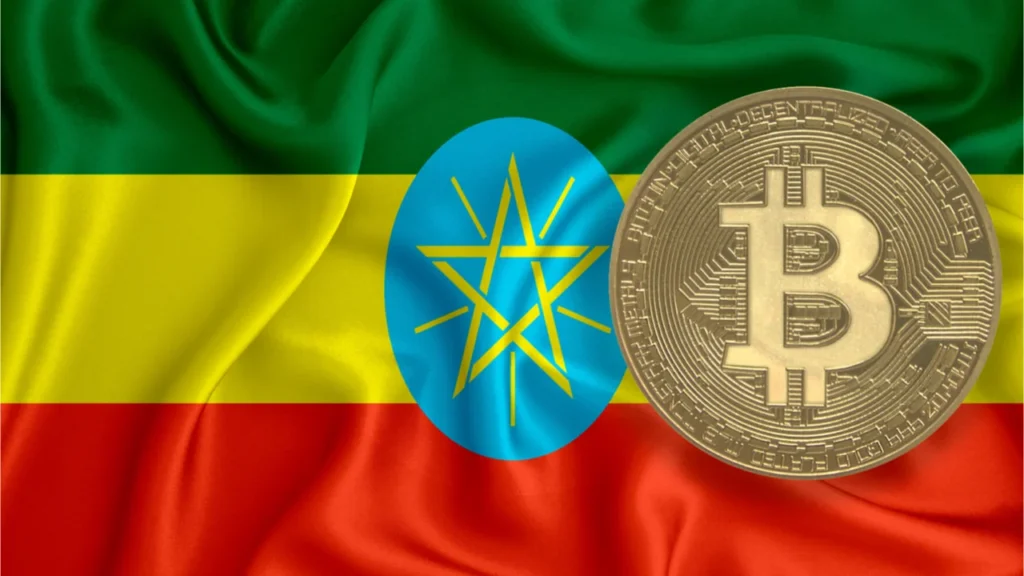- Ethiopia set to establish a $250 million bitcoin mining and AI data centre, led by the Russian bitcoin mining company BitCluster.
- The facility’s capacity to support over 34,000 Antminer S21 200th miners significantly contributes to the Bitcoin network’s hash rate.
- Ethiopia’s embrace of Bitcoin and blockchain technology has the potential to enhance digital inclusion and expand access to financial services.
Blockchain technology has significantly advanced over the past few decades. Today, blockchain in Africa is a heated trend, inspiring many governments to look into the craft. For instance, crypto in Ethiopia initially kickstarted its journey on a low note. Fortunately, with the recent wins of web3, cryptocurrency and digital assets have caught the eye of its governments.
Ethiopia’s ambitions to establish a $250 million bitcoin mining and AI data centre, led by the Russian bitcoin mining company BitCluster, mark a significant milestone in the country’s journey towards incorporating cutting-edge technologies like bitcoin and artificial intelligence into its economic infrastructure.
Aiming to position itself as a global digital economy leader, Ethiopia is harnessing its renewable energy sources to power the advancement of Bitcoin mining and AI development. Project Mano, a strategic initiative capitalizing on Ethiopia’s abundant renewable energy resources, leads this endeavour.
The global economy has been grappling with inflationary pressures, and Ethiopia is no exception. The country has witnessed a notable increase in inflation rates, exacerbating economic challenges. From an exchange rate of approximately 22 Ethiopian Birr (ETB) per US dollar (USD) in March 2018, the official rate has surged to around 56 ETB per USD by January 2024, with estimates indicating even higher rates in the black market, potentially reaching 115 ETB per USD.
Amid these economic uncertainties, Ethiopia recognizes the potential of bitcoin to mitigate the effects of inflation. Unlike fiat currencies, which are subject to centralized control, bitcoin operates within a decentralized framework, offering avenues for economic resilience and independence. Integrating Bitcoin into Ethiopia’s economic landscape presents several opportunities, including mining, holding, and adoption as a medium of exchange.
Ethiopia’s Bitcoin Mining: Pioneering Technological Integration for Economic Advancement
Several factors highlight Ethiopia’s strategic positioning for adopting bitcoin:
Government Interest in Crypto Space: The government has shown keen interest in cryptocurrency, as evidenced by initiatives like Cardano Implementation.
Inflationary pressures: High inflation rates, exacerbated by internal conflicts and the COVID-19 pandemic, necessitate innovative economic solutions.
Trade Deficit: Ethiopia faces a significant trade deficit, necessitating novel approaches to address economic challenges.
Underutilized Energy Resources: The country possesses substantial untapped renewable energy potential, including a politically and financially sensitive 6469 MW capacity.
Cash Dependency: Ethiopia’s reliance on paper currency impedes efficient monetary policy implementation, stifling economic synchronization.
Unbanked Population: With such a large unbanked population, traditional financial systems struggle to retain wealth within the economy, exacerbating currency devaluation.
Clean Energy Potential: Combining Bitcoin mining with renewable energy sources presents a mutually beneficial opportunity for Bitcoin and Ethiopia, facilitating economic growth while advancing renewable energy initiatives.
The separation of gold and money in 1971 serves as a historical parallel to Ethiopia’s current economic predicament. Just as the US abandoned the gold standard, Ethiopia faces challenges due to the inflationary nature of fiat currencies, particularly the US dollar.
Also, read about exploring cryptocurrency adoption in African languages.
The proposed Bitcoin mining and AI data centre project exemplifies Ethiopia’s commitment to integrating innovative technologies into its economy. The facility, strategically located in Addis Ababa near renewable energy sources like the Grand Ethiopian Renaissance Dam, signifies a sustainable approach to Bitcoin mining operations.
The facility’s capacity to support over 34,000 Antminer S21 200th miners significantly contributes to the Bitcoin network’s hash rate. This development underscores the growing trend of renewable energy adoption in the Bitcoin mining sector, emphasizing geographic diversification for sustainable operations.

Choosing Ethiopia as the project site further emphasizes its emergence as a hub for technological innovation and sustainable development. The country’s conducive regulatory environment and cost-effective energy solutions make it an attractive destination for Bitcoin miners seeking sustainable operations.
The impact of integrating Bitcoin mining into Ethiopia’s economy is substantial, with projections indicating a potential annual GDP boost of $2 to $4 billion. This strategic move enhances Ethiopia’s technological infrastructure and positions it as a frontrunner in the clean, energy-driven future of bitcoin mining.
In addition to the direct economic benefits, Ethiopia’s investment in bitcoin mining and AI infrastructure fosters the development of a robust technological ecosystem. Ethiopia cultivates a culture of innovation and knowledge sharing by providing local entrepreneurs, developers, and researchers a platform to engage with cutting-edge technologies. This ecosystem not only attracts foreign investment but also nurtures homegrown talent, paving the way for the emergence of a new generation of tech leaders and innovators.
Furthermore, the creation of Bitcoin mining and AI data centres catalyzes technology transfer and skill development. Through partnerships with international experts and educational institutions, Ethiopia gains access to expertise and best practices in blockchain technology, artificial intelligence, and renewable energy. This knowledge exchange empowers local stakeholders to leverage these technologies for diverse applications beyond mining, such as supply chain management, healthcare, and governance.
Ethiopia’s embrace of Bitcoin and blockchain technology has the potential to enhance digital inclusion and expand access to financial services for underserved populations. By leveraging mobile and digital platforms powered by blockchain technology, Ethiopia can overcome traditional barriers to financial access, such as a lack of infrastructure and banking services. This democratizing financial services empowers individuals and businesses to participate in the digital economy, fostering economic empowerment and reducing inequalities.
Moreover, the transparency and security inherent in blockchain technology can help combat corruption, promote accountability, and ensure the efficient delivery of public services. By digitizing government processes and transactions on a secure and immutable ledger, Ethiopia can enhance governance, reduce bureaucratic inefficiencies, and build trust with citizens and investors alike.
In conclusion, Ethiopia’s ambitious bitcoin mining and AI data centre project exemplify the country’s commitment to harnessing technology for economic development and sustainability. By leveraging renewable energy sources, fostering technological innovation, and promoting financial inclusion, Ethiopia will unlock new opportunities for growth, prosperity, and resilience in the digital age. As the project unfolds, Ethiopia’s leadership in embracing blockchain technology and renewable energy solutions will continue to inspire and shape the future of technology-driven development in Africa and beyond.
Ethiopia’s embrace of blockchain technology and AI will undoubtedly attract global attention as the Project Mano initiative unfolds. This endeavour exemplifies Ethiopia’s commitment to sustainable and innovative economic development, setting a precedent for other nations to use technology for economic advancement.
Also, Read Namibia signs into law cryptocurrency exchange regulation bill.
- SEO Powered Content & PR Distribution. Get Amplified Today.
- PlatoData.Network Vertical Generative Ai. Empower Yourself. Access Here.
- PlatoAiStream. Web3 Intelligence. Knowledge Amplified. Access Here.
- PlatoESG. Carbon, CleanTech, Energy, Environment, Solar, Waste Management. Access Here.
- PlatoHealth. Biotech and Clinical Trials Intelligence. Access Here.
- Source: https://web3africa.news/2024/02/21/news/ethiopia-bitcoin-mining-ai-data/
- :has
- :is
- :not
- 000
- 1
- 2018
- 2024
- 22
- a
- About
- abundant
- access
- accountability
- addition
- address
- Adopting
- Adopting Bitcoin
- Adoption
- advanced
- advancement
- advancements
- advancing
- africa
- African
- age
- Agreement
- AI
- AI Data
- alike
- also
- ambitions
- ambitious
- an
- and
- annual
- Antminer
- applications
- approach
- approaches
- approximately
- ARE
- around
- artificial
- artificial intelligence
- AS
- Assets
- attention
- attract
- attractive
- Attracts
- avenues
- Banking
- barriers
- been
- beneficial
- benefits
- BEST
- best practices
- Beyond
- Billion
- Birr
- Bitcoin
- Bitcoin Miners
- Bitcoin mining
- Bitcoin mining operations
- Black
- blockchain
- blockchain technology
- boost
- build
- build trust
- bureaucratic
- businesses
- but
- by
- CAN
- Capacity
- capitalizing
- Cardano
- catalyzes
- caught
- centralized
- centre
- chain
- challenges
- change
- Citizens
- clean
- combat
- combining
- commitment
- company
- conclusion
- conflicts
- continue
- contributes
- control
- Corruption
- cost-effective
- country
- country’s
- COVID-19
- COVID-19 pandemic
- craft
- creation
- crypto
- crypto space
- cryptocurrency
- Cryptocurrency Exchange
- Culture
- currencies
- Currency
- Current
- cutting-edge
- data
- data mining
- decades
- decentralized
- DEFICIT
- delivery
- Democratizing
- Dependency
- destination
- Devaluation
- develop
- developers
- Development
- digital
- digital age
- Digital Assets
- Digital economy
- digitizing
- direct
- diverse
- diversification
- Dollar
- due
- Economic
- Economic Development
- Economic growth
- economy
- ecosystem
- educational
- effects
- efficient
- embrace
- embracing
- emergence
- emphasizes
- emphasizing
- empowerment
- empowers
- energy
- Energy Solutions
- engage
- enhance
- Enhances
- ensure
- entrepreneurs
- Environment
- establish
- estimates
- Ethiopia
- Ethiopian Birr
- Even
- evidenced
- exception
- exchange
- Exchange rate
- exemplifies
- Expand
- expertise
- experts
- eye
- faces
- facilitating
- Facility
- factors
- few
- Fiat
- fiat currencies
- financial
- financial inclusion
- financial services
- financial systems
- financially
- For
- foreign
- Fortunately
- fostering
- fosters
- Framework
- from
- further
- future
- future of Bitcoin
- Gains
- GDP
- generation
- geographic
- Global
- global digital
- Global economy
- Gold
- Gold Standard
- governance
- Government
- Governments
- grand
- grappling
- Growing
- Growth
- Harnessing
- hash
- hash rate
- Have
- healthcare
- Heart
- help
- High
- High inflation
- higher
- Highlight
- historical
- holding
- homegrown
- HTTPS
- Hub
- immutable
- immutable ledger
- Impact
- implementation
- in
- Including
- inclusion
- incorporating
- Increase
- independence
- indicating
- individuals
- inefficiencies
- inequalities
- inflation
- Inflation Rates
- Inflationary
- Inflationary pressures
- Infrastructure
- inherent
- initially
- Initiative
- initiatives
- Innovation
- innovative
- innovative technologies
- innovators
- inspire
- inspiring
- instance
- institutions
- Integrating
- integration
- Intelligence
- interest
- internal
- International
- into
- investment
- Investors
- IT
- ITS
- itself
- January
- journey
- just
- Keen
- kickstarted
- knowledge
- Lack
- landscape
- large
- Law
- leader
- leaders
- Leadership
- Leads
- Leap
- Led
- Ledger
- Leverage
- leveraging
- like
- local
- located
- Look
- Low
- make
- management
- many
- March
- mark
- Market
- max-width
- medium
- medium of exchange
- milestone
- million
- Miners
- Mining
- Mitigate
- Mobile
- Monetary
- Monetary Policy
- money
- move
- mutually
- Nations
- Nature
- Near
- necessitating
- New
- no
- notable
- note
- novel
- of
- offering
- official
- on
- only
- operates
- Operations
- opportunities
- Opportunity
- Other
- over
- Overcome
- pandemic
- Paper
- Parallel
- participate
- particularly
- partnerships
- past
- Paving
- per
- Pioneering
- platform
- Platforms
- plato
- Plato Data Intelligence
- PlatoData
- policy
- politically
- population
- populations
- position
- positioning
- positions
- possesses
- potential
- potentially
- power
- powered
- practices
- Precedent
- preliminary
- presents
- pressures
- processes
- project
- projections
- promote
- promoting
- proposed
- prosperity
- providing
- public
- Rate
- Rates
- reaching
- Read
- recent
- recognizes
- reduce
- reducing
- Regulation
- regulatory
- reliance
- Renaissance
- Renewable
- renewable energy
- researchers
- resilience
- Resources
- retain
- robust
- russian
- s
- sector
- secure
- security
- seeking
- sensitive
- serves
- Services
- set
- setting
- several
- Shape
- sharing
- showcasing
- shown
- signed
- significant
- significantly
- signifies
- Signs
- site
- skill
- Solutions
- Sources
- Space
- stakeholders
- standard
- Strategic
- Strategically
- Struggle
- subject
- substantial
- such
- supply
- supply chain
- supply chain management
- support
- Surged
- Sustainability
- sustainable
- Sustainable Development
- synchronization
- Systems
- Talent
- tech
- technological
- Technologies
- Technology
- The
- The Future
- These
- this
- Through
- to
- today
- towards
- trade
- traditional
- Training
- Transactions
- transfer
- Transparency
- Trend
- true
- Trust
- unbanked
- unbanked population
- uncertainties
- underscores
- underserved
- undoubtedly
- unlike
- unlock
- untapped
- us
- US Dollar
- USD
- use
- venture
- visionary
- Way..
- Wealth
- Web3
- webp
- which
- while
- will
- Wins
- with
- within
- witnessed
- zephyrnet













